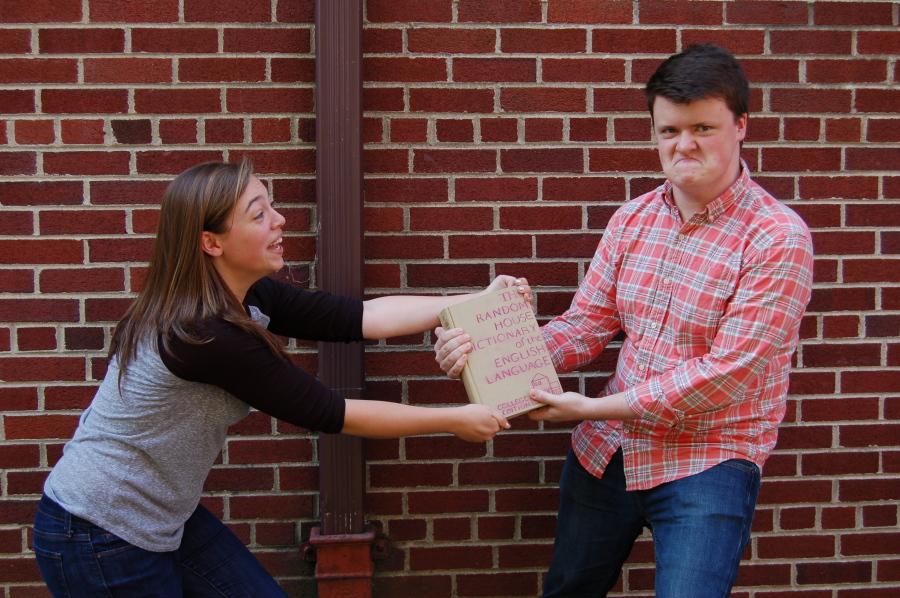He said, she said: Should slang terms be added to dictionaries?
September 21, 2014
He said:
With the creation of new concepts and new technologies comes the necessity for new words to describe them. Or, at least this is what several of the most popular dictionaries believe. I, for one, strongly agree.
In May of this year, “Merriam-Webster” added words such as “selfie,” “hashtag,” and “crowdfunding” to their dictionary (Note: As I type this, Microsoft Word puts a red line under all three of those words). The Oxford English Dictionary followed suit, agreeing that “selfie” is a word, and one-upping “Merriam-Webster” by also adding words like “YOLO,” “humblebrag,” and “binge-watch.”
If you read the comments on any article about these decisions, you can see that many people think this is a terrible idea, saying they are indicative of the impending death of the English language as it devolves into slang and acronyms.
But I disagree. I don’t think that language is meant to stay stagnant. Instead, it should change to reflect the needs of its users. The only reason Shakespeare didn’t use the word “selfie” is because he couldn’t take one. Kerouac never wrote about “binge-watching” his favorite show because he died a few years shy of Netflix.
I think that the real beauty of language comes from the realization that it is ours. It doesn’t belong to Shakespeare and the like, at least not anymore. It belongs to the people who speak it, and when we need a new word to describe a concept, why shouldn’t we just make one up?
I can hear you disagreeing. “But Pat,” you say, “don’t you realize that ‘selfie’ is a stupid word for a stupid concept?”
No. If it weren’t called a “selfie,” what else would it be? I don’t know about you, but I think “self-portrait taken with the front-facing camera on a smart phone” sounds a bit too clunky to work.
And if you don’t like new words to describe new technology like selfies, I’m sure you must feel disgusted every time words like “telephone” and “radio” cross your lips. These words were made up once, too, and we all know that they ruined English as well.
Of course, I’m being facetious. Ideas change. Technology grows. The world changes with it all. We need new words to talk about new things. If you don’t like it, you can #GetOverIt.
She said:
Yes Pat, the English language is constantly adapting. “The Oxford English Dictionary” changes and adds words because our culture and technologies are demanding it to. But, where do we draw the line between a formal, respectable language and shortcut slang?
Oxford Dictionaries, a resource for other dictionaries along with the English language, monitor our everyday use of English. Through a collection of electronic texts called Oxford English Corpus they understand what the words mean but also how we use them in context.
The collected texts can vary from scientific articles to the sassy words of a blogger or a status update concerning what your cousin ate last night for dinner. It’s a wide and risky range to include.
The problem lies not in whether “selfie” is usable in modern-day English but where it is appropriate to apply. When does a language become grammatically correct, yet deficient?
As an example, you try to tell your boss that you cannot attend a very important meeting. “Boss, I am a hot mess today and cannot attend the meeting,” is in fact proper English. By the way, “hot mess” is a word as of August 2014 found in the “Oxford English Dictionary” meaning: “a person or thing that is spectacularly unsuccessful or disordered.”
The line where certain language is appropriate blurs when rules are written by a trusted source such as the “Oxford English Dictionary.” Are slang words appropriate to say in a formal setting when it is now considered grammatically correct?
U.S. News published an article, “How Slang Affects Students in the Classroom,” reporting the effects of text-lingo on high school students.
Teachers complain that students are having trouble writing grammatically correct papers with a slew of vocabulary they learned from Twitter pages. These high school students then cannot write successful admissions papers for acceptance into college.
From here, slang is moving forward as a formal shortcut. The English language, which is a respectable language, from this point can become a pool of informal slang and abbreviations. This whole paradox makes me want to SMH.







